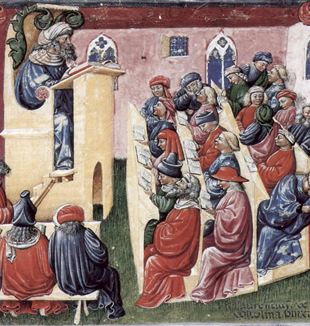
Neutrality Does Not Educate
A year ago, we published the story of a father’s case against the teaching of Ethics instead of Religion in his son’s Catholic high school. Now, the Québec Court has ruled in his favor “because pluralism does not mean freedom.”The ruling on the case of Loyola High School and John Zucchi vs. Québec Ministry of Education, Leisure, and Sport, which arrived at the end of June, spread quickly to the front pages of Canadian newspapers. John Zucchi, co-plaintiff in the suit against a 2009 law introducing the teaching of the Education Ministry’s Ethics and Religious Culture curriculum (ERC), has at least sixty clippings. Certainly, the victory of a Catholic school and a father against a Minister was newsworthy, but even more so was the fact that in his ruling the judge re-affirmed the preamble of the Charter of Rights and Freedoms according to which “the Canadian Nation is based on principles recognizing the supremacy of God and the primacy of the law–both of which benefit from constitutional protection.” His mention of God was sufficient to heat up the keyboards of the Canadian journalists who have been debating for weeks on the implications, not only for jurisprudence, of this metaphysical reference to the Charter of Rights.
Probably when John Zucchi began his little battle alongside Loyola High School a year ago (see Traces, Vol.11, No.7, 2009, p.37), he had no idea that the debate would go so far. In fact, it all began with the attempt to defend freedom of education in the face of the new program in Ethics and Religious Culture defined by the Ministry as “a new educational project for a pluralist society.” In substance, the teaching of religion was eliminated in the name of a more prudent “religious culture,” because, argued the Minister of Education, “only a non-confessional school can guarantee freedom for all.” “According to the program,” John explains, “teachers are to have a ‘neutral’ perspective in the classroom so that students can develop their own positions independently.” The consequences of such a vision are clear to all: faith is no longer relevant, has nothing to do with life or knowledge. You can talk. But don’t dare judge! You would risk being labeled an obscurantist. “In this way, however, all possibility of education is lost,” comments Zucchi. If teachers cannot express a position on ethics, what will they teach their students?
A totalitarian paradox. “Just think what confusion this ‘neutral’ teaching of ethics can cause in a 15-year-old kid.” The paradox is evident. You have to ask yourself what “neutral” means. Even a neutral position implies a choice. John is thinking of his family, his children, but also his students. “If my students were neutral, it would mean either that they’re asleep or that they don’t understand what we’re studying… so I could not remain indifferent–not only as a teacher, but also as a father,” recounts the Canadian professor. “If, in the name of pluralism, we suppress a position of faith lived with awareness, we lose sight of reality.”
John spoke about it at home and at his son Thomas’ school. They compared ideas, asked questions, and then decided they needed to challenge the Ministry. So, last June, the Loyola High School Principal and John went to court with the question: How can you impose a “neutral” education without falling into the totalitarian paradox?
Today, a year later, the Québec court seems to have accepted the provocation. Judge Gerard Dugré handed down a judgement on the case of the Montréal Catholic school that had requested exemption from the ERC program and explained “what it meant to ask a Catholic school like Loyola High School to have a neutral approach.” In his judgment, Dugré wrote, “In this age of the respect of fundamental rights, of tolerance, reasonable accommodation, and multiculturalism, the attitude adopted by the [Education] Minister is surprising.” The judge stated that the government “can in no way obligate a religious institute to teach according to a neutral perspective.”
What we care about. “I am very happy about the outcome of the lawsuit. The Minister still holds to his convictions, this is true. In fact, he has already communicated his intention to appeal to achieve his goal. But that doesn’t matter.” John is calm. He knows well that the story will not end soon. “But I find I am increasingly glad. I’m serene because I know I don’t need to demonstrate anything. Many will attack us, but it will be an occasion for explaining what we care about. I fought for the issue of Loyola High School only for this: to reassert that I am made for a relationship. And this is important above all for education.” The Québec Ministry, instead, struggling to understand, has given up, backing away from the adventure of education. John continues, “In education, a neutral position is not a position. And secularism is not, nor is liberalism. The risk is to fall into the opposite position: ‘The dictatorship of man over man’ [Luigi Giussani, The Religious Sense, p. 92]. Therefore, the only way out, the only salvation, is in a relationship that educates and embraces the person.” This, however, is not taught in the Ethics program.